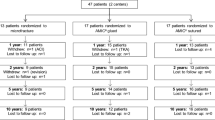Abstract
Purpose
Autologous matrix-induced chondrogenesis (AMIC) is a treatment for focal full-thickness cartilage defects combining microfracturing with an exogenous I/III collagen matrix (Chondro-Gide). The aim of the present study was to determine the 7 years outcomes of patients treated with the AMIC technique for knee chondral defects larger than 2 cm2. The hypothesis was that the positive short-term outcomes achieved in the previous series would not deteriorate at a 7-year follow-up.
Methods
Twenty-one patients treated with the AMIC technique were retrospectively analysed. Patients were assessed through the IKDC subjective knee evaluation questionnaire and the Lysholm scoring system. All patients underwent a complete imaging study including radiographs and magnetic resonance. The median defect size was found to be 4.3 (range 2.9–8) cm2.
Results
At a median follow-up of 7 (±1.4) years, the mean IKDC score improved from 31.7 (±8.9) points preoperatively, to 80.6 (±5.3) at the latest follow-up (p < 0.05). The mean Lysholm score improved from 38.8 (±12.4) points preoperatively to 72.6 (±19.5) points at the last follow-up (p < 0.05). At the last follow-up, 76.2% of patients were satisfied or extremely satisfied with their outcomes, while 66.6% of patients showed good quality repair tissue on magnetic resonance imaging.
Conclusion
AMIC was found to be an effective method to treat full-thickness knee chondral defects larger than 2 cm2, with significant clinical and functional improvement maintained over a 7-year follow-up.
Level of evidence
IV.


Similar content being viewed by others
References
Anders S, Volz M, Frick H, Gellissen J (2013) A randomized, controlled trial comparing autologous matrix-induced chondrogenesis (AMIC®) to microfracture: analysis of 1- and 2-year follow-up data of 2 centers. Open Orthop J 3:133–143
Arøen A, Løken S, Heir S, Alvik E, Ekeland A, Granlund OG, Engebretsen L (2004) Articular cartilage lesions in 993 consecutive knee arthroscopies. Am J Sports Med 32:211–215
Bae DK, Song SJ, Yoon KH, Heo DB, Kim TJ (2013) Survival analysis of microfracture in the osteoarthritic knee-minimum 10-year follow-up. Arthroscopy 29:244–250
Bark S, Piontek T, Behrens P, Mkalaluh S, Varoga D, Gille J (2014) Enhanced microfracture techniques in cartilage knee surgery: fact or fiction? World J Orthop 18:444–449
Bedi A, Feeley BT, Williams RJ (2010) Management of articular cartilage defects of the knee. J Bone Joint Surg Am 92:994–1009
Benthien JP, Behrens P (2010) Autologous matrix-induced chondrogenesis (AMIC). A one-step procedure for retro - patellar articular resurfacing. Acta Orthop Belg 76:260–263
De Girolamo L, Bertolini G, Cervellin M, Sozzi G, Volpi P (2010) Treatment of chondral defects of the knee with one step matrix-assisted technique enhanced by autologous concentrated bone marrow: In vitro characterisation of mesenchymal stem cells from iliac crest and subchondral bone. Injury 41:1172–1177
Dhollander A, Moens K, Van der Maas J, Verdonk P, Almqvist KF, Victor J (2014) Treatment of patellofemoral cartilage defects in the knee by autologous matrix-induced chondrogenesis (AMIC). Acta Orthop Belg 80:251–259
Enea D, Cecconi S, Calcagno S, Busilacchi A, Manzotti S, Gigante A (2015) One-step cartilage repair in the knee: collagen-covered microfracture and autologous bone marrow concentrate: a pilot study. Knee 22:30–35
Flanigan DC, Harris JD, Trinh TQ, Siston RA, Brophy RH (2010) Prevalence of chondral defects in athletes’ knees: a systematic review. Med Sci Sports Exerc 42:1795–1780
Gille J, Behrens P, Volpi P, de Girolamo L, Reiss E, Zoch W, Anders S (2013) Outcome of autologous matrix induced chondrogenesis (AMIC) in cartilage knee surgery: data of the AMIC Registry. Arch Orthop Trauma Surg 133:87–93
Gille J, Schuseil E, Wimmer J, Gellissen J, Schulz AP, Behrens P (2010) Mid-term results of autologous matrix induced chondrogenesis for treatment of focal cartilage defects in the knee. Knee Surg Sports Traumatol Arthrosc 18:1456–1464
Gomoll AH, Madry H, Knutsen G, van Dijk N, Seil R, Brittberg M, Kon E (2010) The subchondral bone in articular cartilage repair: current problems in the surgical management. Knee Surg Sports Traumatol Arthrosc 18:434–447
Goyal D, Keyhani S, Lee EH, Hui JH (2013) Evidence-based status of microfracture technique: a systematic review of level I and II studies. Arthroscopy 29:1579–1588
Kon E, Filardo G, Di Matteo B, Perdisa F, Marcacci M (2013) Matrix assisted autologous chondrocyte transplantation for cartilage treatment. Syst Rev Bone Joint Res 2: 18–25
Kusano T, Jakob RP, Gautier E, Magnussen RA, Hoogewoud H, Jacobi M (2012) Treatment of isolated chondral and osteochondral defects in the knee by autologous matrix induced chondrogenesis (AMIC). Knee Surg Sports Traumatol Arthrosc 20:2105–2111
Pascarella A, Ciatti R, Pascarella F, Latte C, Di Salvatore MG, Liguori L, Iannella G (2010) Treatment of articular cartilage lesions of the knee joint using a modified AMIC technique. Knee Surg Sports Traumatol Arthrosc 18:509–513
Piontek T, Ciemniewska-Gorzela K, Szulc A, Naczk J, Słomczykowski M (2012) Allarthroscopic AMIC procedure for repair of cartilage defects of the knee. Knee Surg Sports Traumatol Arthrosc 20:922–925
Sadlik B, Wiewiorski M (2015) Implantation of a collagen matrix for an AMIC repair during dry arthroscopy. Knee Surg Sports Traumatol Arthrosc 23:2349–2352
Schiavone Panni A, Cerciello S, Vasso M (2011) The manangement of knee cartilage defects with modified AMIC technique: preliminary results. Int J Immunopathol Pharmacol 24(1 Suppl 2):149–152
Williams SK, Amiel D, Ball ST, Allen RT, Tontz WL Jr, Emmerson BC, Badlani NM, Emery SC, Haghighi P, Bugbee WD (2007) Analysis of cartilage tissue on a cellular level in fresh osteochondral allograft retrievals. Am J Sports Med 35:2022–2032
Author information
Authors and Affiliations
Corresponding author
Ethics declarations
Conflict of interest
The authors declare that they have no conflict of interest.
Additional information
This work was performed at the Department of Medicine and Health Sciences of University of Molise, Campobasso, Italy.
Rights and permissions
About this article
Cite this article
Schiavone Panni, A., Del Regno, C., Mazzitelli, G. et al. Good clinical results with autologous matrix-induced chondrogenesis (Amic) technique in large knee chondral defects. Knee Surg Sports Traumatol Arthrosc 26, 1130–1136 (2018). https://doi.org/10.1007/s00167-017-4503-0
Received:
Accepted:
Published:
Issue Date:
DOI: https://doi.org/10.1007/s00167-017-4503-0




